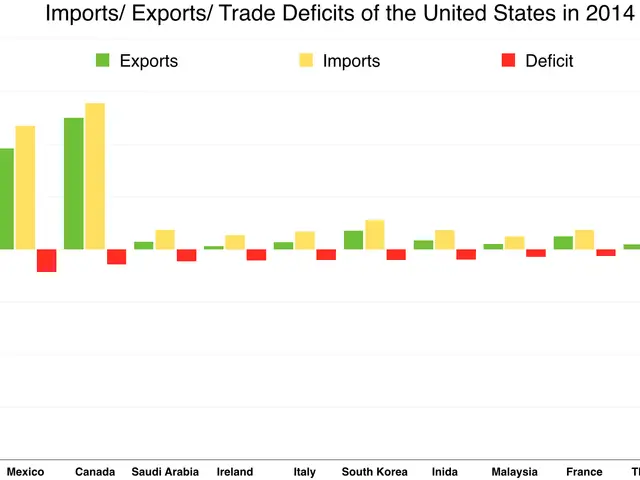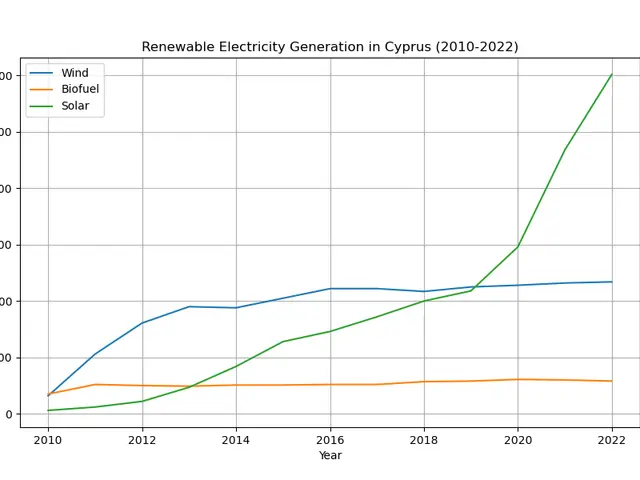EU Member States, such as Poland, call for measures against online retailers Temu and Shein due to concerns over counterfeit goods and unfair competition.
Hey there, buddy! Let's chat about the EU's beef with Chinese e-commerce platforms Shein and Temu. Swarming with goods that allegedly don't meet EU regulations, these platforms are causing a stir among six EU member states. That's right, Poland, Germany, France, the Netherlands, Austria, and Denmark have joined forces to put the pedal to the metal on EU regulators.
You might be wondering, why the fuss? Here's the dish: It's all about safety, legality, and consumer protection. Currently, these platforms are gaming the system by ignoring EU rules, creating an advantage for themselves. This, in turn, threatens consumers' wellbeing and fosters an unfair competitive landscape for companies that play by the rules.
In an open letter to the European Commission (EC), the six nations voiced their frustration over the unchecked flow of goods into Europe. They urged the EC to enforce laws more rigorously to keep consumers safe from shady products. They also emphasized the importance of manufacturers and e-commerce platforms, even those outside the EU, adhering to strict EU standards. That way, the internal market will be fair, and consumers would have access to safe, compliant products.
Now, you're probably wondering which specific platforms are under the microscope? Enter Temu and Shein, two platforms that the EC had previously dubbed as "very large online platforms." This designation requires the companies to toe the line with the Digital Services Act (DSA), a law that aims to police the online sale of illegal products and services. The DSA also aims to squash the spread of harmful content on digital platforms, putting pressure on larger entities like Temu and Shein.
Here's what really has regulators hot under the collar: the sale of counterfeit goods and products lacking proper safety certifications. Consumer advocacy groups have raised the alarm about the questionable goods sold on these platforms, with dubious claims such as unsafe electronics and clothing containing harmful substances. Furthermore, allegations of deceptive practices, like steering consumers towards pricier items, have surfaced.
Online shopping's explosive rise during the COVID-19 pandemic has led to these platforms garnering popularity across Europe. While the rapid growth has been a boon for consumers, it's presented regulators with some challenges. Many European businesses assert that these platforms derive an unfair advantage by skirting rules that local companies must follow, such as product safety standards, customs duties, and VAT regulations.
The six EU countries have called for stricter enforcement of the Digital Services Act. To strengthen their case, they've proposed the introduction of a "digital product passport." This document, which would come with every online product, would ensure it complies with EU regulations, making it easier for authorities to track the origin and compliance of products.
The growing scrutiny of Temu and Shein in Europe is not new. Consumer organizations across the continent have raised concerns over the platforms' practices, from product safety to intellectual property violations. In Poland, the Ministry of Development and Technology has previously sounded the alarm over Temu. Now, the ministry, along with its EU counterparts, is insisting that these platforms be held accountable.
As these platforms' popularity continues to grow in Europe, regulators are stepping up their game to protect local markets, businesses, and consumers. The joint letter from these six EU countries marks a potential turning point in ensuring that these platforms toe the EU line.
Now, the European Commission must navigate a tricky balancing act between promoting free trade and shielding consumers and businesses from unfair competition. The introduction of stricter enforcement measures, like the proposed digital product passport, might bring some much-needed transparency to online marketplaces. But it remains to be seen how effectively these platforms will be monitored and if they'll bend to the rigorous demands of EU law.
Stay tuned as the debate heats up, and the spotlight stays firmly on the EU Commission to take action and safeguard consumer interests and keep the competitive landscape level.
- The EU's beef with Chinese e-commerce platforms Shein and Temu is centered on safety, legality, and consumer protection, as they allegedly don't meet EU regulations.
- The platforms' disregard for EU rules creates an advantage for them, threatening consumers' wellbeing and fostering an unfair competitive landscape for compliant businesses.
- Six EU member states - Poland, Germany, France, the Netherlands, Austria, and Denmark - have joined forces to pressure EU regulators to enforce laws more stringently.
- In an open letter to the European Commission, the six nations voiced their concern over the unchecked flow of goods into Europe and urged stricter adherence to EU standards by manufacturers and e-commerce platforms.
- The Digital Services Act (DSA) designates large online platforms like Temu and Shein to follow specific regulations, aiming to police the online sale of illegal products and services, and squash the spread of harmful content.
- The sale of counterfeit goods and products lacking proper safety certifications, along with deceptive practices like steering consumers towards pricier items, are the main concerns highlighted by consumer advocacy groups.
- The rise of these platforms during the COVID-19 pandemic has presented challenges for regulators, with European businesses asserting that the platforms derive an unfair advantage by skirting local rules.
- Proposed solutions include stricter enforcement of the DSA and the introduction of a "digital product passport" to ensure every online product complies with EU regulations, making it easier for authorities to track the origin and compliance of products.
- The growing scrutiny of Temu and Shein in Europe marks a potential turning point in ensuring these platforms adhere to EU rules, as regulators work to protect local markets, businesses, and consumers from unfair competition and harmful practices.










